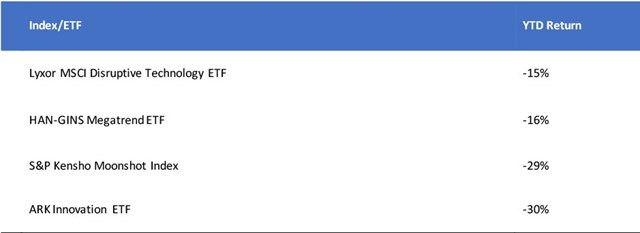Sasfin Innovation Portfolio - Quarterly Review - Q1 2022
Global equity markets endured a challenging quarter that included the Russian invasion of Ukraine and the commencement of an interest rate hiking cycle by the US Federal Reserve (Fed).

Global equity markets endured a challenging quarter that included the Russian invasion of Ukraine and the commencement of an interest rate hiking cycle by the US Federal Reserve (Fed). Against this backdrop, we saw markets retreat very sharply following a rewarding 2021.
While the longer-term performance of the Sasfin Innovation Portfolio remains robust at 24% per annum in dollar terms, the portfolio experienced a 13% decline in the first quarter of 2022, compared to a 14% decline in its benchmark.
Despite significant bouts of volatility throughout the quarter, most of the portfolio’s drop occurred in January. We were only a few days into the new year when equity markets began to fall as investors started to price in the possibility of the Fed increasing interest rates in an effort to reel in red-hot levels of inflation. In general, equity prices and the direction of interest rates have an inverse relationship. The theory goes that the fundamental value of a company’s equity, as well as other assets for that matter, is based on the value of the future cash flows that are expected to be generated by the company, discounted back to the present day. Higher interest rates increase the rate at which those cash flows are discounted and consequently, reduce the value of those future cash flows. So called “growth stocks”, which are found predominantly in the technology sector, and carry a sizeable weighting in this portfolio given its mandate and objective, generally react more violently to changes in interest rates relative to other sectors. This can be seen in the declines experienced by these higher-growth areas of the market so far this year:

In terms of the Innovation Portfolio, the holdings which held up the best in the quarter were 3D-printer manufacturer and software provider Stratasys, the iShares Global Clean Energy ETF, the First Trust NASDAQ Cybersecurity ETF and satellite communication group Iridium Communications. The ones which came under the most pressure were streaming device maker Roku, Chinese e-commerce group Baozun, online education company 2U and Chinese fintech group LexinFintech Holdings.
After 18-24 months of an intense regulatory crackdown, we decided to sell our relatively small direct holdings in China - LexinFintech Holdings and Baozun – due to the companies’ uncertain outlooks, and because we believe it would be more prudent to rather look at indirect exposure to this economy. Our view of China over the next ten years remains constructive. However, given the current macro environment, we choose to limit company-specific risk.
LexinFintech Holdings, which is predominantly an online consumer finance platform, was not spared as the Chinese fintech industry increasingly came under pressure. This crackdown happened while the US accounting regulators also pushed for Chinese companies listed in the US to open their books for audit purposes which created a fear of US de-listings.
Loan pricing cuts were seen in the sector and interest rate caps were implemented - which will put pressure on earnings growth. The regulators are still not done with this sector in China, and the latest media reports suggest that they could be pushing for borrowing activities to be completed on licenced financial institutions’ apps – this could be an issue as many of these fintech platforms do not hold formal licensing. Amongst the listed online lenders, it appears some of LexinFintech’s competitors are better positioned for formal licencing.
Baozun helps multi-national companies with marketing, IT, navigating Chinese regulations, and distributions in China. The company’s performance has been disappointing for some time. Some of the concern came from sluggish top-line growth, that was only driven by acquisitions, as realised growth was constantly postponed. We expect the company’s sales growth to grow at a rate below that of the industry and the earnings outlook remains uncertain and volatile.
Pandemic-winner 2U has declined sharply. The company offers cloud-based services for online learning and content distribution. The company’s full-year results disappointed the market and its guidance for the current year was below expectations. The Innovation Portfolio had a very small holding in 2U.
Given the current investment climate, we only want to hold high conviction, best-in-class companies, where growth justifies current valuation. In our opinion, LexinFintech, Baozun and 2U did not fit that role anymore.
The investment team is actively exploring adding a new direct stock to the portfolio, to complement an existing ETF holding. Our primary objective going forward is to ensure that we achieve long-term capital appreciation in the without taking on too much risk (volatility) for our clients.
Click here to get PDF
Click on the image below to view the video